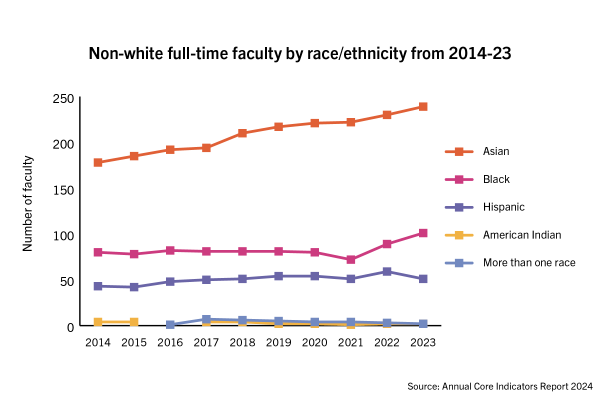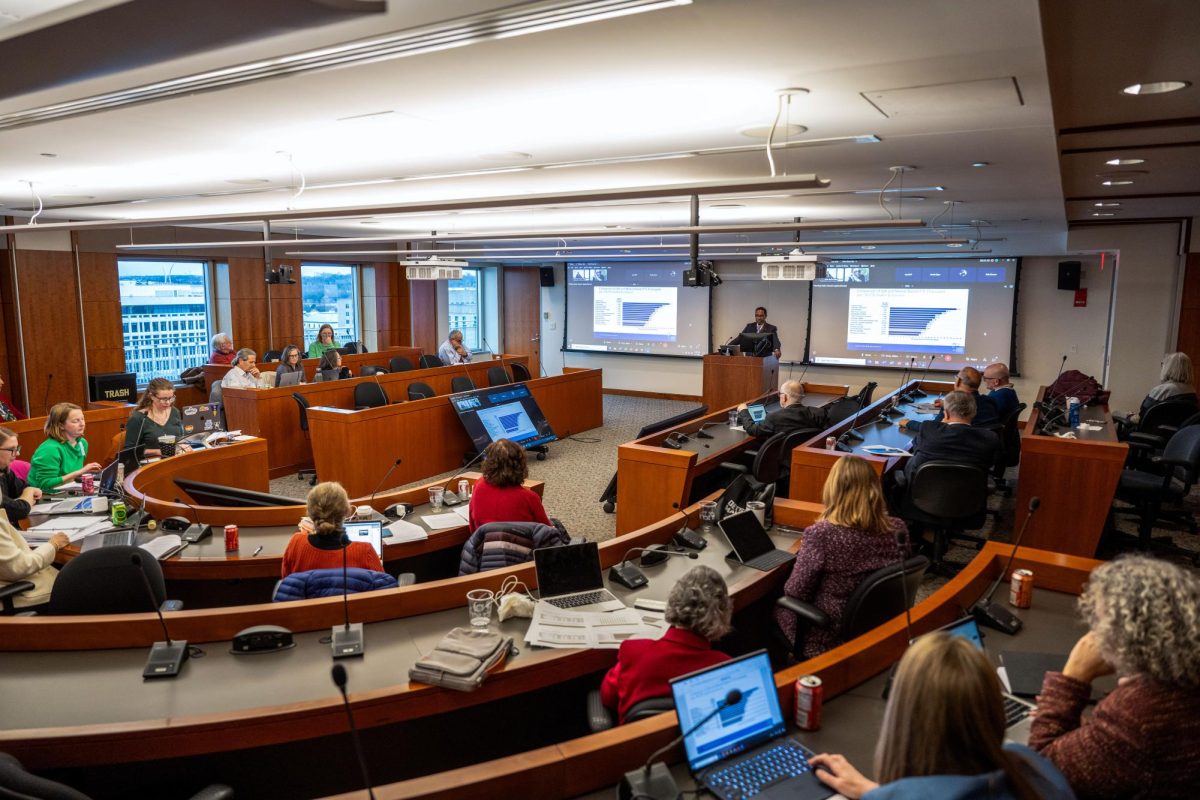Faculty diversity increased from 2021 to 2023 after “intentional” hiring efforts, according to the annual core indicators report presented at the Faculty Senate meeting Friday.
Provost Chris Bracey presented data at the meeting that showed the number of Black faculty has increased by 29 members and the number of Asian faculty increased by 17 members between 2021 and 2023. The report states that the number of Hispanic faculty decreased, with a decrease of eight faculty members between 2022 and 2023, while Native American faculty has remained consistent at two faculty members.
“We’re struggling a little bit with Hispanic hires, but overall it does appear as though we are increasing the diversity of our faculty,” Bracey said at the meeting.
The number of first-year students with a high school GPA above 3.89 jumped from 18 percent of the first-year class in 2014 to 34 percent in 2023, the report states. Bracey said the decadelong rise may be an indication of grade inflation at the high school level, particularly during the pandemic, but that it may also reflect a greater number of high-performing students entering the University because the first-year retention rate of 91.9 percent in 2022 indicates first-years are successful at GW despite potential grade inflation.

The University enrolled 1,593 international students in fall 2023, after falling from 1,614 in fall 2019 to 770 in fall 2020, according to the report. Bracey said the total number of international students has bounced back to near pre-pandemic levels but the number of international residential undergraduate students is nearly half of what it was in fall of 2019. Graduate, law, medical and nondegree international students have breached pre-pandemic fall 2019 levels, according to the report.
“Our loss of Chinese students has been significant, there’s no doubt about that,” Bracey said. “But as you can see, we have backfill from areas such as India, South Korea, Saudi Arabia, Azerbaijan, Egypt, Brazil and Nigeria.”
Philip Wirtz, a faculty senator and professor of decision sciences and psychological and brain sciences, asked University President Ellen Granberg if former Chief Financial Officer Mark Diaz is still affiliated with GW after a discussion with other faculty about Diaz’s involvement with the Medical Faculty Associates’ restructuring in 2018.
Granberg said she wasn’t aware of Diaz doing work for GW since his departure, but CFO Bruno Fernandes said GW pays Diaz for consulting on arrangements with Universal Health Services, which owns GW Hospital. Wirtz said faculty are confused because officials led them to believe that Diaz is not affiliated with the MFA.
University spokesperson Julia Metjian said in an email that Diaz is not involved with GW’s day-to-day operations, but officials kept Diaz as a consultant to maintain consistency in the management of the “complexities” in the restructured agreement between the MFA and UHS. She declined to comment on how much officials pay Diaz for his consulting services.
Senators also approved an addendum to the Code of Academic Integrity that temporarily revised the composition of academic integrity panels. Senators approved a measure during the meeting that defines a full academic integrity panel as three members — one must be a student and one must be a faculty member — from the pool of trained members. Before the change, a full panel consisted of two faculty and three students.
The Student Government Association also passed the temporary change at their meeting last Monday, meaning the addendum has been officially adopted into the code. Christy Anthony, the director of the Office of Student Rights and Responsibilities, proposed academic integrity panel mitigation strategies in December in response to a 313 percent average increase in reports of academic integrity violations when compared to the past two fall semesters. Anthony said she considered instituting a “jury pool model” to select faculty to serve on the panels but did not go through with it because maintaining training of SRR panelists would be difficult among a wide pool of faculty.
Sarah Wagner, a faculty senator and professor of anthropology, said the temporary changes to the number of panelists is “not sustainable” for a long period because fewer faculty will be involved.
“There’s an intensity of the caseload which, combined with a limited number of panelists, means that this interim mitigation strategy will likely lead to, believe it or not, burnout,” Wagner said during the meeting.
Granberg said she traveled to Florida twice in the past month, once to attend a Milken Institute session on the future of higher education where she discussed the future of higher education with the university presidents of Miami and Brandeis universities, the University of Utah and one of the founders of the University of Austin. She said there were “a number of efforts” to provoke the University leaders into various statements which they “successfully avoided.”
“There is still broad recognition of the importance of higher education and also questions around how we can make sure that we’re maintaining the environment of free and open discussion,” Granberg said. “That’s certainly been a topic here, and it was a topic there as well.”
She said she visited Sarasota, Naples, Palm Beach and Miami to hold two GW Together events because they are the four major cities in Florida with the largest proportion of alumni. Granberg began a tour of the United States in September to speak with alumni and donors about the University’s strengths and challenges.
Vice Provost for Faculty Affairs Rumana Riffat delivered an annual salary equity review progress report, which identified schools with potential faculty salary outliers to make the necessary salary adjustments to achieve more equitable pay. Columbian College of Arts and Sciences had 27 outliers, the most of GW’s 12 schools and colleges, but only four adjustments. Riffat said the low number of salary adjustments in CCAS despite their high number of outliers can be attributed to two retirements and “poor” performance from some faculty.
CCAS Dean Paul Wahlbeck said CCAS faculty salaries are coded as “low” if there is a high salary outlier in their department. Officials examine each rank of salaries and identify any disparities that call for an adjustment, he said.
The Milken Institute School of Public Health had the second-most outliers with 14 outliers and five adjustments. Riffat said the model accounts for the department, school and rank of faculty members and adjustments were made based on consultation and feedback from deans about the faculty’s performance.
“This is, of course, based on the performance of a particular faculty member,” Riffat said. “In some cases, the faculty may be retiring, based on submission or nonsubmission of annual reports, et cetera.”
Fiona Riley, Grace Chinowsky, Ianne Salvosa and Rachel Moon contributed reporting.





